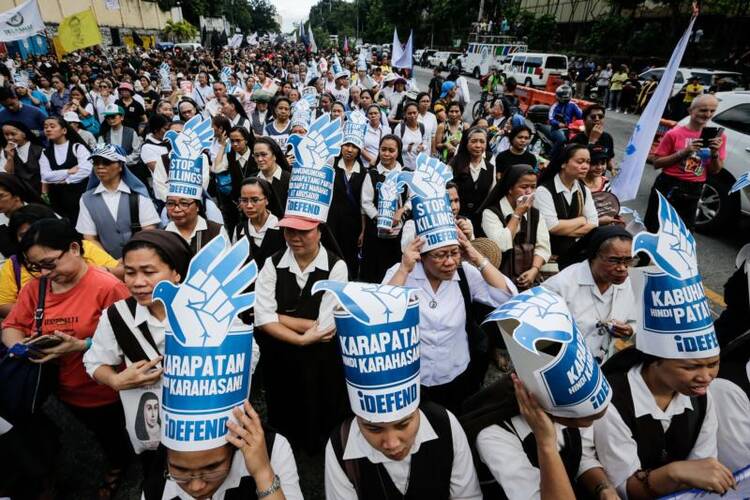Expressing concern about thousands of deaths in the nation's so-called "war on drugs," the president of the Philippine bishops' conference has sought courage from a deceased cardinal whose influence helped overthrow a dictator in the mid-1980s.
Archbishop Socrates Villegas of Lingayen-Dagupan wrote a public letter to Cardinal Jaime Sin Feb. 25, the 31st anniversary of the peaceful People Power revolution, which led to the ouster of President Ferdinand Marcos.
Archbishop Villegas, who was a newly ordained priest and Cardinal Sin's personal secretary in 1986, recalled the four "glorious days" when millions of ordinary Filipinos converged on Epifano de los Santos Avenue outside of the country's military headquarters and toppled Marcos. He had been in power for more than 15 years, implementing an authoritarian style that grew more oppressive the longer he stayed in power.
Marcos had ordered his military to disperse angry crowds that claimed he stole a snap election against opposition leader Corazon Aquino, but soldiers stood down, allowing Aquino to take office and restore democracy to the young nation.
Cardinal Sin, who, with other church leaders, was being pursued by the Marcos government, sent a message on Catholic radio to religious and clergy to drop everything and pray with the crowds on the avenue. The message continued to be broadcast despite government attempts to destroy station transmitters.
Marcos took sanctuary in Hawaii, where he died three years later.
"The glory now flickers in the darkness and fear again," Archbishop Villegas wrote, "the songs of peace now drowned by the cuss words of hate that invite murder; the bloodless revolt now stained by the blood in our streets and street gutters."
Since President Rodrigo Duterte took office in June, about 7,000 mostly poor people have died in police raids and killings carried out by unknown assailants. Using explicit language, Duterte campaigned on a promise to rid the country of criminals, threatening to kill them and encouraging the public to do the same.
Archbishop Villegas lamented that under the Duterte administration, Marcos' body was buried in the country's Cemetery of Heroes and that history was being "rewritten" and "revised." He asked the cardinal, who died in 2005, to "shake us (the faithful) up from our timidity."
"Teach us your faith. Teach us righteous indignation. Wake us up from our pacifism and pull us into the fire of passion and courage again," he wrote.
In an angry retort, Duterte's daughter, Davao City Mayor Sara Duterte-Carpio, addressed Archbishop Villegas in a Facebook post, saying her father better understood the spirit of the 1986 revolution and called the archbishop's "group ... a bunch of delusional hypocrites."
The Duterte administration's official commemoration of the revolution took place on Feb. 24, instead of the previously recognized on Feb. 25.
Archbishop Villegas also said everyone who faces criminal charges should receive a "fair day in the court of laws," after government authorities arrested and detained Sen. Leila de Lima, one of Duterte's harshest critics, on Feb. 24.
De Lima, who was ousted as chairwoman of the Senate Justice and Human Rights Committee, had launched an investigation into the drug killings. The current administration said de Lima ran a drug operation out of the country's national prison when she was justice secretary under Benigno Aquino III's administration from 2010 to 2015.
The day after the arrest, more than 1,000 people rallied outside national police headquarters near a shrine marking the 1986 revolution, protesting the "war on drugs." Late in the day, a crowd that organizers said numbered about 6,000 gathered to remember the revolution at the shrine site in support of democracy, calling for respect of human rights and justice.
A far bigger crowd that police estimated at 200,000 assembled at a Manila park across town in a show of support for Duterte. Among that crowd were a group of Marcos supporters.










